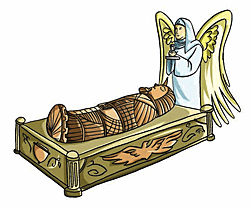sarco-, sarc-, -sarcous, -sarc, -sarcoma, -sarcomatous, -sarcomatoid
(Greek: flesh, meat)
Sarcomas may occur in any part of the body, and are typically fast-growing and quick to spread.
2. Etymology: from 1657, "fleshy excrescence", Medical Latin, from Greek sarkoma "fleshy substance" (Galen), from sarkoun, "to produce flesh, to grow fleshy"; from sarx, sarkos, "flesh".The meaning "harmful tumor of the connective tissue" was first recorded in 1804.
Experts say that the best approach to restoring or of maintaining muscle strength and function is exercise; especially, resistance training; in other words, muscle-strengthening and muscle-building exercises can prevent or reverse much of this problem of sarcopenia.
Sarcopenia contributes to the pathogenesis of frailty. Among the factors responsible for sarcopenia; such as proinflammatory cytokines (various proteins, secreted by cells), low growth hormone and testosterone levels, increased production of oxygen free radicals, malnutrition and reduced neurological drive, immobility and lack of exercise have a dominant role; therefore, the diagnosis of frailty is mandatory for the early identification of elderly subjects at high risk, which can receive benefit from rehabilitation.
A self-report and objective evaluation of physical performance are the best indicators of frailty in elderly subjects, a poor performance suggesting the need of an early and proper intervention.
Structured exercise programs are effective in diminishing the progression of frailty, but a healthy and active lifestyle may also be sufficient for delaying the onset of disability in some people.
To summarize, there is clear evidence for a prescription of exercise within the mainstream of medical practice for the elderly.
The word sarcopenia was coined in the late 1980' or early 1990's by William J. Evans and Irwin Rosenberg, who used it in their 1991 published book, Biomarkers: The 10 Determinants of Aging You Can Control.
Besides the probability of muscle loss from hormonal changes, sedentary lifestyles, oxidative damage, and the infiltration of fat into the muscles; some of the problems may also be a result of the deterioration of the brain and nervous system, both of which are responsible for activating the muscles.
2. From Greek, sarkophagos, through Latin, sarcophagus; so named because the limestone, in which people were buried, caused rapid disintegration or decomposition of the bodies.
3. Among the ancient Greeks and Romans, it was a limestone coffin or tomb, often inscribed and ornamented.
4. Now, by extension, the term is used for any stone coffin, especially a large or monumental tomb.

The ancient Greeks used, for the making of coffins, a limestone which disintegrated the flesh of bodies deposited in it within a few weeks.
Such a coffin was called sarkophagos, literally, "eating flesh," a word formed from sarx, "flesh," and phagein, "to eat." From this origin comes our word sarcophagus, which has lost its literal significance and denotes merely any stone coffin or large coffin placed where it may be seen.
An extended explanation of Sarcophagous is available for your examination.
Related "meat, flesh" word units: carno-; creo-, kreo-.


